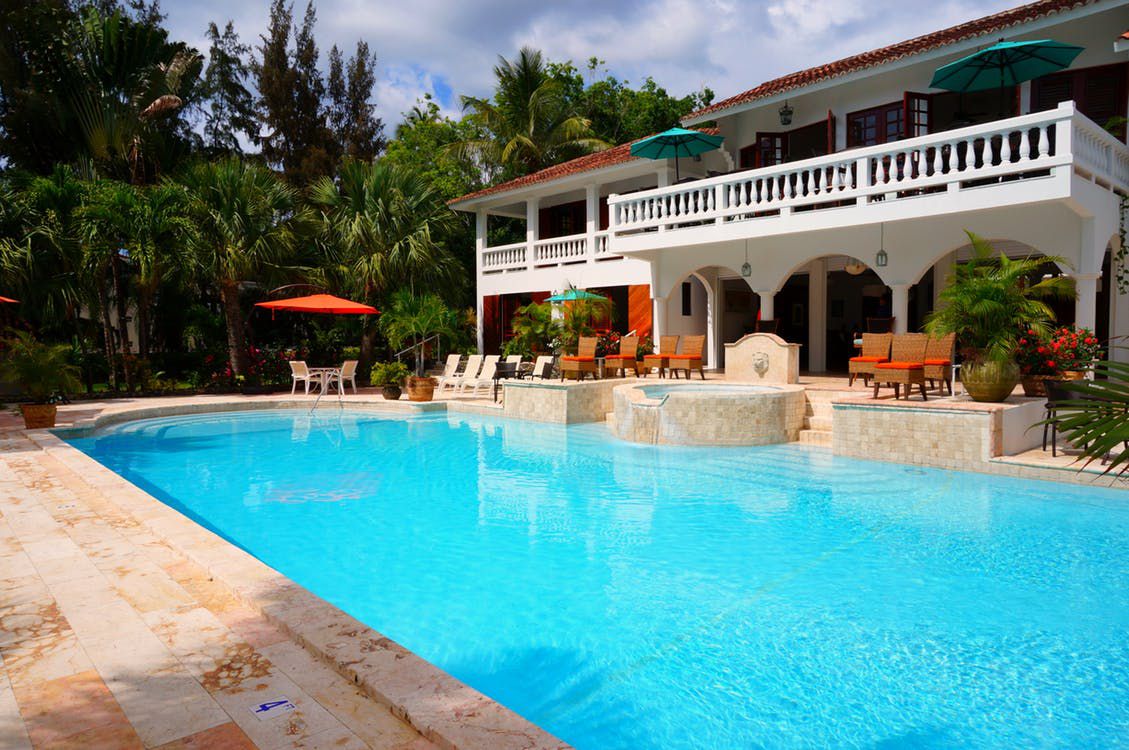Well, it's that time of year again, folks. And after another relentless winter, I say good riddance!
But with the warmer weather, the ‘swimming bug' will soon be affecting all of us. (That is, if it hasn't already done so.)
In fact, as I write this article and sit in my car at a parking lot in Yorktown, Virginia, the temperature outside is about 93°F degrees on April 7. Wow, now that's what I call skipping spring!
During this time of year, it is normal as a pool owner to start to wonder when is the best time to open your pool. When is too early? When is too late?
This is a legitimate concern, and as experienced pool manufacturers, I'll share our thoughts on this matter.
This is our general, all-encompassing rule of thumb:
When the temperature is consistently above 70 degrees during the day, it's time to open the pool.
Below are 5 things to consider when deciding the right time to open your pool:
- Algae
- Mother Nature
- Pollen
- Expense
- Beauty
When should I open my pool?
We recommend you open your pool when the temperature is consistently above 70 degrees during the day. This can help prevent algae from growing, help manage pollen in the water, and doesn't cost much more than opening later in the spring.
1. Algae
Warmer temperatures breed algae in a swimming pool.
For swimming pools with mesh winter covers (allowing sunlight through), too much sunlight can spell days of work to get the pool up to ideal swimming conditions.
Personally, I'd much rather open up the pool earlier to find a cleaner pool than wait an additional month to be welcomed by a mountain of algae. If your pool has algae growth when you open it, an appropriate pool shock treatment* can help bring the water back to its "normal" state.
*Always test your pool water and review the pool water balance, chemistry range, and product type recommendations provided by the manufacturer of your inground pool before adding any chemical products to the water. Follow all application and safety instructions on the label of any product used.
2. Mother Nature
Mother Nature is a funny lady. She loves to play tricks on all of us.
This was certainly the case this past weekend when I opened my pool. My neighbors thought it was silly that I was opening the pool so early in April. Of course, when they saw my kids in the pool yesterday, they didn't think it was such an odd decision any longer. And this is without even having a heater on the pool.
It's pretty satisfying that it's early April and my kids are literally at home in our pool as I write this article.
3. Pollen
Pollen can wreak havoc on allergy sufferers during the spring months. As for swimming pools, it also wreaks havoc on non-circulating water.
For example, a lot of the pools that are still closed right now are allowing pollen to get in the water and just sit there. This will make it even more difficult to open and clean the pool later.
But for the pools that are open and circulating, the pollen will be simply sucked into the skimmer and caught by the filter. That will, in turn, keep it from turning your pool into a yellow lagoon.
4. Expense
Many people hesitate to open their pool early because they feel it's too expensive. But for pools with variable speed motors on their filter systems, if you open it while the water is still clear, the chemical and electrical cost is almost nominal.
Today's variable speed pumps can be programmed to operate at the lowest speed necessary to maintain clear water, and your installer or local service provider can help fine-tune the exact needs for your pool. It's very likely you'll spend less than $10 more by opening early.
And when you compare that to the extra chemicals and cleaning required with a late opening, doesn't an early opening make more sense?
5. Beauty
I don't know about you all, but to me there is nothing better than firing up the grill in April and having great food and fun with friends and neighbors. And nothing says 'Swimming pool season!' like the beautiful sound of splashing and enjoyment of your newly opened pool.
Remember, many pool owners spend more time on their pool's patio than they do in the actual pool, so the sooner the pool is open, the sooner one can enjoy the beauty of their backyard investment.
So these are our top five reasons not to wait on your swimming pool opening. For those of you who have an inground swimming pool, check out our How to Open an Inground Pool Video.
As always, we at River Pools hope everyone has a wonderful summer in their swimming pool.

Up Next:
The Ultimate Guide to Inground Swimming Pool Maintenance
Editor's note: This article was originally written by Marcus Sheridan and was updated on December 16, 2024, with current information. River Pools is a brand of inground fiberglass pools produced in a manufacturing facility in Fortville, IN. While our expertise is in manufacturing fiberglass pools, we have access to a network of installers with expertise relating to project design, installation, and pool service. We often tap into this knowledge base and share information freely with homeowners, just like you, considering installing a swimming pool in your backyard.



